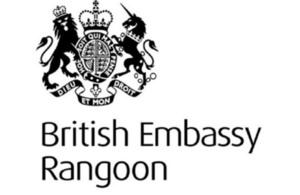UK introduces Health Surcharge
Non-EEA nationals, including Burmese, who plan to live longer than six months in the UK will have to pay £200 per year to get access to NHS.

British Embassy Rangoon
From 6 April, all nationals from outside of Europe, including Burmese nationals, coming to live in the UK for longer than six months will be required to pay a ‘health surcharge’ in order to gain access to the UK’s National Health Service (NHS).
Currently non-European nationals coming to work, study or join family members receive free medical treatment under the UK’s NHS in the same way as a permanent resident.
These changes will ensure that those coming to live in the UK make an appropriate financial contribution to the cost of their healthcare.
The health surcharge will be £200 per year and £150 per year for students and will be payable at the same time that an individual submits their visa application on-line. Visa applicants will need to pay up-front for the total period of their UK visa.
British Ambassador to Burma H.E Andrew Patrick said:
The UK is hugely proud of its National Health Service, which provides world class care to all residents. It is only fair that those coming to live or study in the UK make a financial contribution to the public services they are entitled to access, which is why we are introducing this change.
We, of course, recognise the very valuable contribution those coming to the UK to study and work make to the wider economy and so have deliberately kept the surcharge at a competitive level - lower than most private health insurance policies.
The changes will not affect visitors coming to the UK on a visit visa and visitors will continue to have to pay for any treatment they receive from the NHS at the point they receive it.
The surcharge levels are lower than the cost of medical insurance required in some of our competitor nations and, for overseas students, the surcharge represents only 1% of the total cost of studying in the UK for a three year undergraduate course.
Having paid the surcharge, migrants will have the same access to the NHS as a UK permanent resident for the duration of their visa. The money generated by the health surcharge will go directly to funding the NHS.
Applicants in Burma need to pay the surcharge in cash at the same time as paying the visa application fee when they attend their appointment at the visa application centre.
Further information and guidance is on.gov.uk
Notes to editors:
-
The charge will be applicable to relevant visa applications submitted and paid for online from 00:01 GMT on April 6 2015.
-
The UK Home Office will collect the charge as part of the immigration application process and payment will be mandatory for those affected.
-
Applicants in Burma need to pay the surcharge in cash at the same time as paying their visa application fee when they attend their appointment at the visa application centre. UK Visas and Immigration will be unable to issue a visa to applicants required to pay the Health Surcharge if they have not paid. Further guidance and details of the payment portal will be published on the .gov.uk website from April 6 2015.
-
When an application is refused, rejected or withdrawn, the charge will be refunded. The charge will be set at an annual rate. Affected migrants will pay, up front, an amount that covers the entire period of their permission to stay in the UK.
-
In England alone, use of the NHS by overseas visitors and migrants is estimated to cost up to £2 billion a year – with £950 million of this being spent on temporary, non-EEA workers and students.
-
International students cost the NHS around £430 million per year and over £700 per head. The surcharge for students will be just £150 per year, a fraction of their true cost to the NHS. It is 1% of the cost of studying in the UK and is well below the price students pay for private health insurance in competitor countries, such as Australia and the USA.
-
Dependants will pay the same amount as the main applicant.
-
Non-EEA nationals coming to the UK on a visit visa of 6 months or less are not affected by the change and will not pay the health surcharge.
-
Certain groups will be exempt from the surcharge and will continue to receive free NHS care. These include Australians, New Zealanders, Tier 2 Intra-Company Transfers and Dependents of Her Majesty’s Forces. A full list of exemptions is on the gov.uk website
-
Tier 2 inter-company transfers, Australian and New Zealand nationals must still complete the process through the surcharge web site. They will be informed the payment is nil but receive a unique surcharge reference number. This number is needed for their immigration application to confirm their exemption from the surcharge